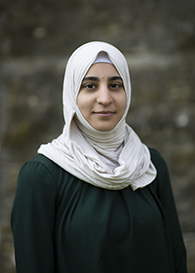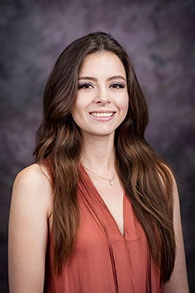K-State doctoral candidates earn Sarachek awards for outstanding academic and research work
MANHATTAN — Three Kansas State University doctoral candidates have received Sarachek awards for their academic and research achievements.
Linah Alkotami, doctoral candidate in biochemistry, Saudi Arabia, was awarded the $17,600 Alvin and RosaLee Sarachek Predoctoral Honors Fellowship in Molecular Biology. Bianca Morejon Viteri, doctoral candidate in biology, Ecuador, and Upasana Dhakal, doctoral candidate in plant pathology, Nepal, earned $1,000 Sarachek Scientific Travel Awards.
The Sarachek fellowship and travel awards were established by RosaLee Sarachek and the late Alvin Sarachek, Wichita, to recognize resident graduate students enrolled in a doctoral program at K-State who have demonstrated exceptional research and academic accomplishments. An interdisciplinary faculty selection committee determines the fellowship and travel award recipients. The awards program is offered through the university's Graduate School.
Alkotami's research aims to genetically modify the seed oil composition of two non-food winter oilseed crops — Camelina sativa and pennycress — to produce large amounts of acetyl-triacylglycerols, or acetyl-TAG. Acetyl-TAG oil has reduced viscosity and can be used without the costly processing required for regular vegetable oils in many industrial applications, such as 'drop-in' biofuels, biodegradable lubricants and food emulsifiers. Alkotami has successfully generated transgenic plants with seeds that accumulate 93-98% of acetyl-TAG without compromising germination and seed viability.
Alkotami's work has demonstrated that with the precise manipulation of biochemical pathways, it is possible to completely change the type of oil that a plant can produce. In addition to their industrial value and contribution to green energy, these modified plants can be used as a resource to study and gain fundamental insights into the functions of different oil biosynthetic pathways and how these pathways redirect in response to genetic engineering. Timothy Durrett, associate professor of biochemistry and molecular biophysics, is Alkotami's major professor.
After completing her doctoral degree, Alkotami plans to continue working in the field of genetic engineering with a focus on advancing plant science and improving agricultural productivity. Alkotami intends to pursue a postdoctoral researcher position to facilitate her transition into an academic career as a principal investigator. Her primary goal is to develop market-ready crops that produce high-value compounds and crops that match the needs of farmers for agronomic performance in specific climates. Alkotami will use the fellowship funds to broaden her expertise in interdisciplinary areas by attending bioinformatics and entrepreneurship training programs as well as professional development and networking events. Part of the funds will also be used to support relocation to a prospective postdoctoral position.
Morejon conducts genetic research on mosquito immune responses. Mosquitoes are called the most dangerous animals in the world because they are responsible for about 750,000 human deaths each year by spreading diseases like malaria. Mosquitoes fight pathogens that invade their bodies by mounting a strong immune response, which is regulated by extracellular protease cascades.
Morejon's research is focused on determining the contribution of proteases to overcoming bacterial, fungal and ultimately, parasitic infections in the African malaria mosquito, Anopheles gambiae. This knowledge can help assess current mosquito control strategies and develop genetic manipulation techniques to enhance the mosquito's ability to eliminate parasites before they reach humans. Kristin Michel, professor of biology, is Morejon's major professor.
Morejon will use the Sarachek travel award funds to attend the International CNRS conference, Insect Models for Infection Biology, which will be held in Roscoff, France, in June. Morejon has been accepted by the conference organizers to present her research findings. Presenting her research at this conference will give Morejon the opportunity to network with researchers in her field and explore potential postdoctoral opportunities.
Dhakal studies Fusarium graminearum, a fungal pathogen of wheat and barley that reduces crop yield and deposits harmful mycotoxin in infected grains. Dhakal uses population genomics and quantitative genetics approaches to understand the genetic basis of fitness traits like virulence, mycotoxin production and fungicide sensitivity.
Her research will provide new candidates for functional studies to understand the mechanism of pathogen fitness. The knowledge of candidate targets and underlying mechanisms can be used to develop cultivars that are less susceptible to infection by the fungus and do not support mycotoxin production. Christopher Toomajian, associate professor of plant pathology, is Dhakal's major professor.
Dhakal will use the Sarachek travel award in August to attend the Plant Health 2023 conference in Denver, Colorado. In December, she will also use part of the award to attend Fusarium Head Blight Forum in Cincinnati, Ohio. The award will provide Dhakal an opportunity to share her research findings and expand her professional network.
Alvin Sarachek received his doctorate in genetics from Kansas State University in 1957. He and his wife, RosaLee Sarachek, created the fellowship and travel awards because he valued the university's tradition of offering a broad array of quality programs in the life sciences, many with outstanding national reputations. The Saracheks wanted to contribute to the tradition of excellence by recognizing students who have demonstrated exceptional research accomplishments involving molecular approaches to biological problems.
More information on the Sarachek awards is available on the Graduate School website.



